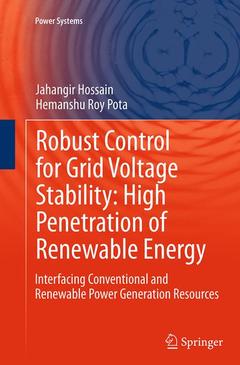Description
Robust Control for Grid Voltage Stability: High Penetration of Renewable Energy, Softcover reprint of the original 1st ed. 2014
Interfacing Conventional and Renewable Power Generation Resources
Power Systems Series
Authors: Hossain Jahangir, Pota Hemanshu Roy
Language: English
Subject for Robust Control for Grid Voltage Stability: High...:
138.03 €
In Print (Delivery period: 15 days).
Add to cartSupport: Print on demand
Description
/li>Contents
/li>Biography
/li>Comment
/li>
This book makes the area of integration of renewable energy into the existing electricity grid accessible to engineers and researchers. This is a self-contained text which has models of power system devices and control theory necessary to understand and tune controllers in use currently. The new research in renewable energy integration is put into perspective by comparing the change in the system dynamics as compared to the traditional electricity grid. The emergence of the voltage stability problem is motivated by extensive examples. Various methods to mitigate this problem are discussed bringing out their merits clearly. As a solution to the voltage stability problem, the book covers the use of FACTS devices and basic control methods. An important contribution of this book is to introduce advanced control methods for voltage stability. It covers the application of output feedback methods with a special emphasis on how to bound modelling uncertainties and the use of robust control theory to design controllers for practical power systems. Special emphasis is given to designing controllers for FACTS devices to improve low-voltage ride-through capability of induction generators. As generally PV is connected in low voltage distribution area, this book also provides a systematic control design for the PV unit in distribution systems. The theory is amply illustrated with large IEEE Test systems with multiple generators and dynamic load. Controllers are designed using Matlab and tested using full system models in PSSE.
Dr. Jahangir Hossain received his Ph.D. in Electrical and Electronics Engineering from the University of New South Wales, Australia. He is currently a lecturer in the Griffith School of Engineering, Griffith University, Gold Coast, Australia. Before joining Griffith University, he served as a research fellow in the School of Information Technology and Electrical Engineering, University of Queensland, Australia. His research interests are power systems, renewable energy integration and stabilization, voltage stability, micro grids, robust control, electrical machine, FACTS devices and energy storage systems.
Dr. Hemanshu Pota is a Professor at the University of New South Wales. His research interests are in the areas of modelling and control of flexible structures and acoustical noise and cable-driven long-reach manipulators. He has worked on obtaining models for distributed parameter systems using symbolic algebra software. He has also worked on various control techniques for distributed parameter systems and the chief amongst them are: H-infinity, spatial control, resonant control, passivity based controller design and minimax LQG control.
Covers an area of modern robust control capable of solving practical control problems, with material essential for engineers to design and implement these controllers
Provides background material necessary for transient studies and controller design
Includes Matlab and PSSE software scripts for transient stability analysis and control design for large scale systems



